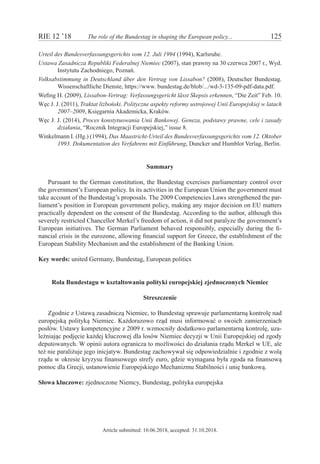Dax Volatility: The Role Of Bundestag Elections And Key Economic Figures

Table of Contents
The Impact of Bundestag Elections on Dax Volatility
The period surrounding Bundestag elections is often characterized by heightened uncertainty, significantly impacting Dax volatility. This uncertainty stems from the unknown political landscape post-election and the potential policy shifts that a new government might implement.
Pre-Election Uncertainty and Market Fluctuations
The lead-up to Bundestag elections typically sees increased market uncertainty. Investors become more cautious, closely monitoring poll results and political rhetoric. This heightened sensitivity translates into:
- Increased trading volume: As investors react to news and adjust their portfolios, trading activity intensifies.
- Heightened market sensitivity: Even minor events can trigger significant price swings due to the amplified anxiety.
- Potential for sharp price swings: The Dax can experience substantial gains or losses depending on perceived election outcomes and potential policy changes.
For example, the 2017 election, which resulted in a coalition government, saw initial market dips followed by a period of relative stability once the new government's policies became clearer. Past elections have demonstrated that the uncertainty surrounding the outcome can significantly influence the Dax's performance.
Post-Election Stability (or Instability)
The formation of a new government, and the subsequent policy announcements, significantly impacts market sentiment. A clear mandate often leads to greater investor confidence, while a coalition government with conflicting agendas can create instability.
- Policy announcements: Key policy decisions regarding fiscal policy, taxation, and regulation directly influence specific sectors and the overall market.
- Investor confidence: A stable government with a clear economic agenda tends to boost investor confidence, leading to a more stable Dax.
- Long-term market trends: The long-term implications of government policies shape the overall direction of the Dax. Pro-business policies generally support a positive market trend.
Key Economic Indicators and Dax Volatility
Beyond political events, several key economic indicators strongly correlate with Dax volatility. These indicators provide insights into the health of the German and wider European economy, directly affecting investor sentiment and market performance.
Inflation and Interest Rates
Inflation and interest rates are intrinsically linked to Dax performance. High inflation often prompts the European Central Bank (ECB) to raise interest rates to curb price increases. This can negatively impact the Dax as higher borrowing costs reduce business investment and consumer spending.
- Inflation expectations: Market participants carefully monitor inflation figures and forecasts, influencing their investment decisions.
- ECB monetary policy: The ECB's actions regarding interest rates and quantitative easing directly impact the Dax's trajectory.
- Bond yields: Changes in bond yields reflect investor sentiment towards risk and the overall economic outlook, influencing the Dax.
For example, periods of high inflation historically led to a downturn in the Dax, as investors seek safer assets. Conversely, periods of low and stable inflation tend to correlate with a stronger Dax.
Unemployment and Economic Growth
Unemployment rates and GDP growth are critical indicators of economic health, directly impacting Dax performance. Low unemployment and strong GDP growth typically translate into increased consumer spending and business investment, bolstering investor confidence and supporting Dax growth.
- GDP figures: Quarterly GDP releases provide crucial insight into the overall economic momentum.
- Employment reports: Changes in unemployment rates influence consumer confidence and business investment decisions.
- Consumer confidence: High consumer confidence indicates increased spending, which is positive for the Dax.
Conversely, high unemployment and sluggish economic growth can lead to investor pessimism and a decline in the Dax.
External Economic Factors Influencing Dax Volatility
The Dax is not immune to global economic events. External factors can significantly influence its volatility.
- Global trade tensions: Trade wars and protectionist policies can negatively impact German exports and harm the Dax.
- Oil prices: Fluctuations in oil prices, particularly for a manufacturing-heavy economy like Germany, can significantly affect corporate profits and investor sentiment.
- US economic performance: Given the close ties between the US and German economies, the performance of the US economy can have a substantial impact on the Dax.
Conclusion: Understanding Dax Volatility for Informed Investment Decisions
This analysis highlights the significant influence of Bundestag elections and key economic indicators on Dax volatility. Understanding these factors is crucial for developing effective investment strategies. Investors must monitor Dax volatility, analyzing Dax trends, and assessing the impact of these factors on specific sectors and individual stocks. By proactively monitoring these factors, investors can better mitigate Dax risk and potentially enhance their returns. Further research into specific economic models and political analysis can provide a more granular understanding of Dax volatility. Learn to analyze Dax trends and utilize this knowledge to make informed investment decisions.

Featured Posts
-
 Ecbs Simkus Hints At Two Further Interest Rate Cuts Amidst Trade War Concerns
Apr 27, 2025
Ecbs Simkus Hints At Two Further Interest Rate Cuts Amidst Trade War Concerns
Apr 27, 2025 -
 Offenlegung Gemaess Artikel 40 Absatz 1 Wp Hg Pne Ag Meldet Ergebnisse
Apr 27, 2025
Offenlegung Gemaess Artikel 40 Absatz 1 Wp Hg Pne Ag Meldet Ergebnisse
Apr 27, 2025 -
 Chargers To Kick Off 2025 Season In Brazil Justin Herberts Role
Apr 27, 2025
Chargers To Kick Off 2025 Season In Brazil Justin Herberts Role
Apr 27, 2025 -
 Canada The Rising Star In North American Tourism
Apr 27, 2025
Canada The Rising Star In North American Tourism
Apr 27, 2025 -
 Understanding Ariana Grandes Artistic Choices Hair Tattoos And Self Discovery
Apr 27, 2025
Understanding Ariana Grandes Artistic Choices Hair Tattoos And Self Discovery
Apr 27, 2025
